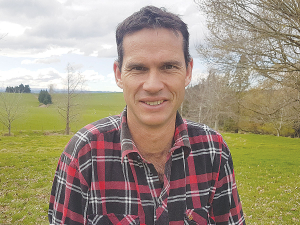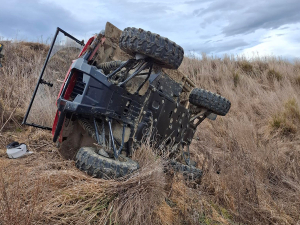South Otago sheep and beef farmer Hamish Bielski questions if the desire to develop and breed low methane emitting sheep may cause other important and valuable traits, that have been developed over many years of sheep breeding in NZ, to be lost. In the following article he explains the risks…
One of the great initiatives from sheep breeders in recent years was the Beef + Lamb Genetics Low Input Trial.
While the trial’s aim was to find productive, efficient sheep that require low inputs, Beef + Lamb Genetics was enthusiastically using the programme to expand methane research.
Research has shown that selecting for a low methane emitting sheep will breed a smaller animal, with a smaller rumen, that will need to eat more high-quality feed to maintain productivity (Waghorn 2020). Low methane emissions from sheep also has correlations with higher wool weight and lower ewe body condition scores. This not only adds cost via more work but may even lower efficiency and profit from a smaller, potentially skinnier sheep.
My question to the “low methane” proponent is: Which productive and low input traits should we compromise?
It has taken decades to breed the most productive sheep in the world. These are all the traits we as farmers have to consider to increase returns on farm. Reproduction and survival mean more live lambs. This influences the annual ewe replacement as a percentage of total lambs born; the number of ewes/ha and of course the number of sale lambs.
Selecting for high growth means the faster lambs grow, the less feed is required. Meat yield increases carcase weights from a lower liveweight. This improves the sale options to a farmer by creating more flexibility and more value from selling lambs at a lower liveweight.
Adult weight and body condition score (BCS). The interaction between these two traits is such that a lower adult size is a liability if it also has a poor BSC. A positive BCS allows the ewe to handle tough seasons, storing ‘energy’ on her back to perform when conditions are favourable. This trait selects animals that can use themselves as a buffer against climate, seasonality of pasture production and their own feed requirements.
Facial eczema challenges can go so far as to mean a dead sheep is neither productive, efficient nor profitable. Naturally then, in certain areas, this is a trait heavily selected for in flocks.
WormFec/Carla/resilience traits seek to identify those animals that support an immune response to limit or eliminate the reproductive ability of any worms in the gut, or just perform under a worm challenge. Considering 33% of farms were reported to have triple drench resistance to parasites in 2023 and that bionic capsules are now banned, these are important traits.
Recording and selecting for animals that minimise the production of dags result in lower requirements for fly treatments and crutching over time.
All of these traits minimise production losses in a farm business or they mean less work and they directly influence the profit of a business. So again, which of these traits do we compromise for methane?
I think, the only way these targeted low methane sheep will be used by farmers is if we are paid to or taxed into submission.
Language is very powerful, so when Beef+Lamb Genetics roll out the ‘gas chambers’ that measure methane production to as many breeders as possible, they name it the “cool sheep programme”. No one would ever entertain the idea if it was named the “skinny sheep project”, which in my view more accurately reflects the possible outcomes.
The science papers researching methane in NZ sheep are hinged on solving a reported problem that is based on a GWP100 metric that is outdated or overstating the ruminant methane by a factor of 3-4 (IPCC AR6).
What frustrates me immensely is the same one liner rolled out of the same ‘group think’ narrative: “We have to be seen to be doing something.” I find this insulting to all the farmers, breeders and scientists who have gone before and are now breeding and managing NZ’s productive sheep flock.
After reading through research papers on methane, what has not been clearly presented by Beef + Lamb Genetics is the potential negative consequences of methane selection. What has made it worse is our breeders have had the fear tactic cast over them, in that “if they haven’t got rams with methane bvs, farmers won’t be buying rams off them”.
Let’s stand and support our breeders in their decision to reject putting their rams in the ‘gas chambers’, because if we all stand together, we paralyse the system. We then can get on breeding robust, resilient, productive sheep that convert solar energy through pasture into superfood.
As Syd Harris so well puts it, “The greatest enemy of progress is not stagnation, but false progress”.
Hamish and Amy Bielski farm 300ha of rolling hill country between Clinton and Balclutha on the banks of the Pomakaka River. Hamish spent 10 years on the Beef and Lamb Southern South Island Farmer Council, with three of those years as the chair.



















